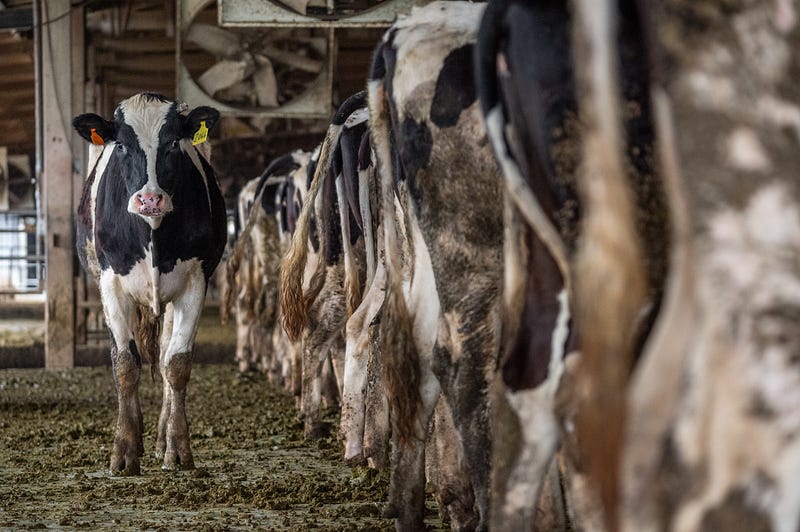The Growth of Plant-Based Meat and Its Impact on the Environment
Written on
The Evolution of Plant-Based Meat
In recent times, the popularity of plant-based meat has surged as more consumers look for alternative protein options to traditional animal-based meats. This shift is influenced by various factors, including health concerns, nutritional benefits, and environmental sustainability.
By creatively combining ingredients like beans, lentils, peas, and grains, plant-based products can replicate the sensory experience of meat without the environmental and ethical costs associated with animal farming. This innovation allows consumers to enjoy their favorite dishes guilt-free, knowing they are making a more sustainable choice.
From Niche to Mainstream: The Changing Landscape
Initially, plant-based meat alternatives catered primarily to vegetarians and vegans, finding their place mainly in health food stores rather than in mainstream supermarkets and eateries. However, a growing awareness of sustainability issues, food security, and the adverse effects of industrial animal farming has sparked a broader demand for these alternatives.
New plant-based products are designed to mimic the taste and texture of meat, appealing to a larger consumer base. As highlighted by the Good Food Institute (GFI), the trend began with Beyond Meat’s chicken strips in 2012 and gained momentum with the introduction of the Impossible Burger and the Beyond Burger in 2016.
Thanks to advancements in technology, investment, and the efforts of innovative startups, the plant-based meat sector has flourished. Today, it resonates particularly with "flexitarian" consumers who seek to incorporate more plant-based options into their diets.
Despite the narrative in 2022 that the plant-based meat industry was facing decline, as noted by Sonalie Figueiras, such claims are largely overstated. Beyond being a flavorful and convenient substitute for animal products, plant-based meats also offer significant environmental advantages, making them a crucial asset in the fight against climate change.
Environmental Advantages of Plant-Based Meat
Even with a rise in vegetarianism and veganism in certain regions, global meat consumption is expected to increase by 50% from 2013 to 2050. In the U.S., the average person consumes over 200 pounds of meat each year. While some countries consume less meat, the global trend is towards increased consumption, driven largely by the expanding middle class in Asia and Latin America.
Animal agriculture heavily impacts the environment, leading to severe repercussions for our natural ecosystems.
- Greenhouse Gas Emissions

Research from the Food and Agriculture Organization (FAO) indicates that animal farming generates more greenhouse gases than the global transportation sector. Cows, for example, produce methane during digestion, contributing to approximately 9% of worldwide greenhouse emissions, while pigs and chickens, although they don’t emit methane in the same manner, still produce significant manure that results in nitrous oxide emissions.
Plant-based meats have a considerably lower carbon footprint. The majority of their environmental impact arises from the initial production of raw ingredients, which typically have low greenhouse gas emissions.
- Land Usage

Animal agriculture occupies a staggering 77% of all agricultural land, despite only providing about 17% of human food. This inefficiency necessitates the expansion of agricultural land, often leading to deforestation as forests are cleared for pasture and feed crops. In contrast, plant-based meat requires 47% to 99% less land than traditional meat production.
By substituting some animal farming with plant-based alternatives, it could free up land for food production or environmental restoration, such as reforestation. The GFI estimates that if all agricultural land in the U.S. were redirected to produce food for human consumption instead of animal feed, it could potentially feed more than double the current population.
- Water Consumption

Plant-based meats are significantly less water-intensive than their animal-derived counterparts. A study by Johns Hopkins University found that producing one kilogram of pork requires over five times as much water as a plant-based equivalent.
Animal agriculture consumes a large portion of global agricultural water, primarily for crop irrigation for livestock feed. The GFI reports that plant-based meat uses 72% to 99% less water than traditional meat.
- Nutrient Pollution

Eutrophication, caused by excess nitrogen and phosphorus runoff, is a significant threat to water quality worldwide, with animal agriculture being a major contributor. According to GFI, plant-based meats generate 51% to 91% less nutrient pollution than conventional meat products.
Predictions suggest that if current trends continue, eutrophication could lead to a substantial rise in methane emissions over the next century.
Conclusion
Plant-based meat presents numerous environmental benefits, including reduced greenhouse gas emissions, lower land and water usage, and a smaller carbon footprint when compared to animal-derived meat. These advantages underscore the importance of plant-based meat in addressing climate change.
However, plant-based meat currently represents less than 2% of the global meat market. To expand its market share and impact, plant-based products must match animal meat in taste, texture, and affordability. Here are four strategies to enhance adoption, as suggested by BCG and Synthesis Capital:
- Continued innovation and investment in technology by scientists, startups, and established food companies.
- Supportive policies and regulations fostering the shift to alternative proteins.
- Public funding for open-access research to tackle major technical challenges and inspire growth.
- Strategic incentives like investment tax credits and loan guarantees to boost alternative protein infrastructure.
This first video discusses the environmental impacts of plant-based meat substitutes, highlighting how they can reduce our carbon footprint.
The second video explores the argument that simply eating less meat may not suffice to save the planet, providing insights into the broader context of meat consumption and sustainability.